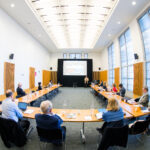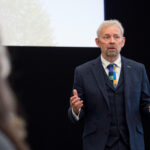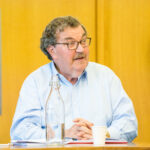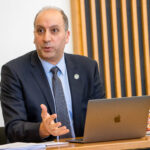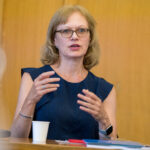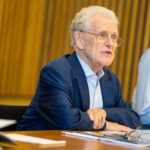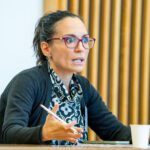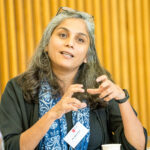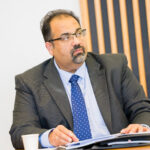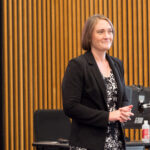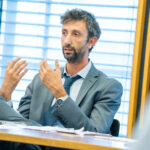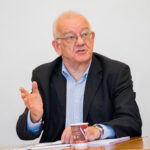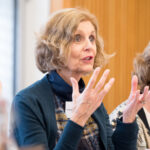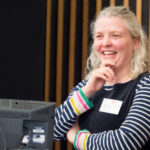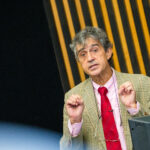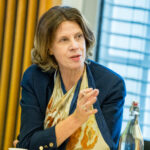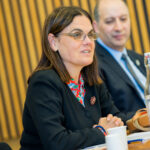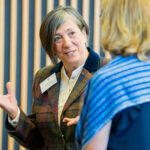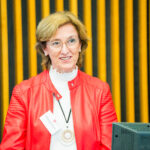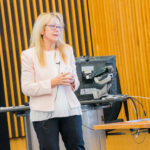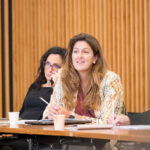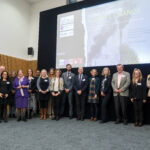Home and Climate Change, 5th Experts Meeting
Understanding the power of home to transform societies in the face of Climate Emergency
28-29 September 2023 | Nottingham Conference Centre, Nottingham Trent University, UK
Academic Leaders: M. Gamal Abdelmonem and Antonio Argandoña
This Expert Meeting aims to explore the role home and family play in the transition towards a sustainable and carbon-neutral planet, where our Carbon footprint is neutralised by offsetting our consumption with the production of clean energy and a sustainable lifestyle. Building on the lessons learnt during COVID-19 Pandemic, and the global response to a universal emergency, this meeting will bring experts, scholars and scientists from diverse disciplines, professions, and research backgrounds to debate the challenges and opportunities facing the home as societal institutions to achieve that goal. It tries to respond to a key question, ‘how can we engage more effectively with the home and family as a resilient unit to help societies and economies combat Climate Change?’
See the participants biographies
Key themes/ strands
1. The Care of the Planet: Love and Care at the Heart of Climate Response
Our planet is our shared home. It is key to our survival and our perception of living. On the personal and cultural levels, we care for our planet because we truly understand that the planet is our home. As we ought to take care of our individual and most intimate homes, it is also imperative to take care of the all-encompassing home, on which we live and the one that houses and shelters our nations. Under this strand, we will discuss the philosophical meaning of love and care within the context of care for the home and family. It connects the universal home, the planet and its wellbeing, to the very personal and intimate home of the family.
2. Climate Change & Public Health: The Health and social care of the Home
This strand will discuss current and projected impact of global warming on family members and potential risks to essential support systems in healthcare, social care and wellbeing of individuals and vulnerable groups. Many studies reported the effects of extreme weather and heatwave on the health of older and more vulnerable people who need care. This covers variable factors that influence our health, from direct impact through excessive heatwave, torrential rains, wildfires, poor air quality, and enduring dry seasons to indirect ones that result from the limitation to our healthcare systems and their capacity to increasing demands. This strand will distil the multiple studies and evidence on such change on households and potential risks. It will then recommend a set of steps that enable future healthcare policy to counter those impact and prepare the state response mechanism in the context of adverse conditions.
3. Consumption & ecological footprint: Energy, Food and Transportation
This strand will focus on everyday lifestyle and consumption, through multiple examples of household consumptions in both developed and developing world. It will put into perspective the disparities of CO2 emissions and consumption of energy though work, food supply chain and transportation (essential and luxury). Whilst studying current patterns of societies, it will summarise best practice in active reduction of carbon emission in progressive states and cities to recommend practical steps in achieving sustainable lifestyle and consumption patterns.
4. Remote economy and home-based work: digital homes changing economic and Work/Life balance
This strand will pick on several studies that debate the critical role the redistribution of economy, job markets and trade in offsetting the carbon consumption through remote patterns of work and trade from home. It will look at recent change in economic operations, and digital infrastructure that are needed to support families working from home and connect them to wider network of trade and markets. It will gather evidence on how this model may or may not support a permanent shift in our life/work balance at home and how we can be active economically with minimum use of travel and public transportation. This strand will map effective economy and corporations that relied managed to remain active during the Pandemic, those new economies that emerged to compete with traditional sectors.
5. Connected Locality: Net-Zero Homes & Neighbourhoods
Under this strand, we aim to discuss the design of carbon neutral housing and the development of net-zero cities through multiple models around proximity of the family to essential services, markets, local supplies. It considers the effective and practical impact of the 20-minute neighbourhood model, where self-sufficiency of family needs and domestic network of supplies, services, and daily needs exist in walking distance of 10 minutes. It will investigate architecture, innovation and artificial Intelligence in the make-up of greener homes and developing new forms of construction to cope with periods of torrential rains and extreme temperatures.
6. Building Climate Resilience: Raising awareness through art and culture and education
Under this theme, we aim to explore what means of art and cultural education can help young individuals for developing awareness of the role of their homes and families in responding to climate emergencies and its consequences, like increased deprivation, displacement, and health risks. It will investigate our learning institutions consideration of the home, family practices and power of education to change societal attitudes towards the environment. It will study the influence of public art and culture in shaping the public knowledge and awareness of the centrality of the environmental concerns to every day’s life of the home and family. This will consider art and culture response to extreme weathers and natural disasters as a man-made catastrophe.
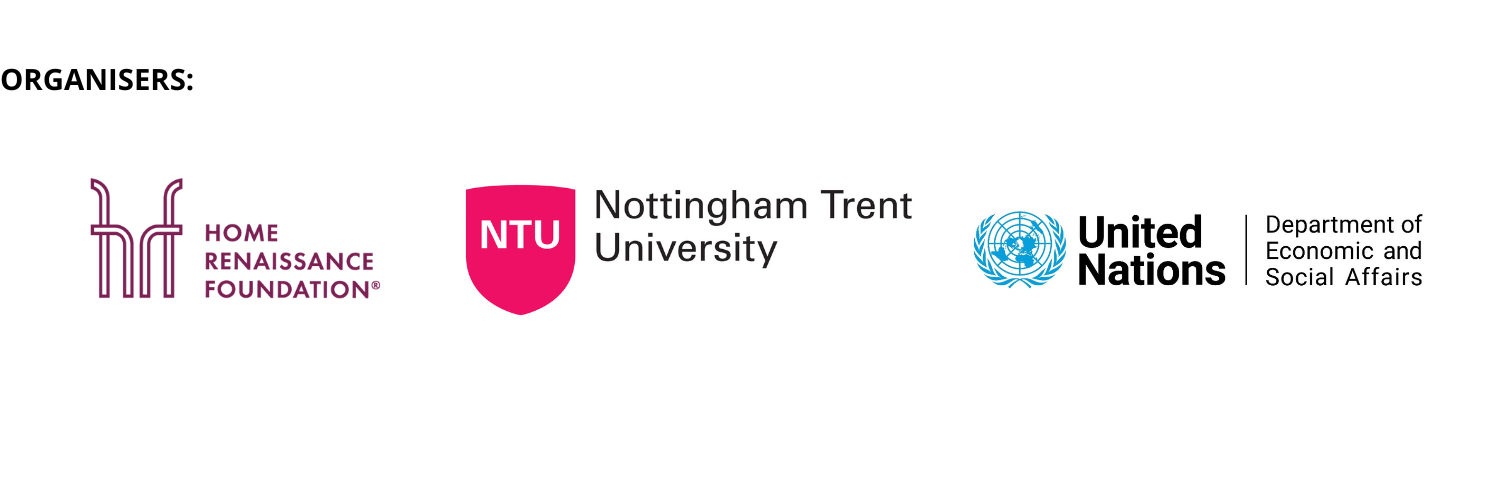
SUPPORTING PARTNERS:

PHOTOGRAPHS:
Sophia Aguirre, new President of Catholic Distance University
HRF Director Maria Sophia Aguirre, Ph.D., a distinguished Ordinary Professor of Economics and researcher in the field of finance, family, and economic development, has been appointed President of Catholic Distance University on July 1, 2023.
Dr Aguirre has been part of our board since HRF began. She led our latest Experts Meeting in Washington on Home and Displaced People last year. Furthermore, she has participated in several conferences with enriching papers that have been part of our publications.
A tenured faculty member at The Catholic University of America, Dr. Aguirre has 30 years of teaching and research experience while holding leadership positions at the academic programme level, department and school levels, as well as the university at large. She was a Fulbright scholar in 2012–2013.
After completing Accounting and Business Administration degrees in Argentina, Dr. Aguirre worked in accounting and commodities trading in Chicago for several years before earning an M.A. and then a Ph.D. in Economics from the University of Notre Dame with a focus on monetary and fiscal policies and international financial markets. She has represented countries, including the Holy See, in international organizations, and served the U.S. President and Secretary of State as a presidential appointee confirmed by Congress in the capacity of Commissioner and Adviser for two presidential terms. Dr. Aguirre has testified before Congress in the U.S. and in several other countries and has lectured and published extensively both domestically and internationally.
Dr. Aguirre has worked to develop and implement Integral Economic Development (IED), an interdisciplinary approach to economic analysis that recognizes the role of social relationships—first manifested by the family—as key drivers of economic activity. Dr. Aguirre’s research, and the two master’s degree programmes in Integral Economic Development she founded, have led to successful collaboration with a variety of business leaders, academicians, technologists, and policy makers by improving the lives of millions of people in the developing world. She is currently on leave at the University of St. Thomas in Houston conducting research on the application of IED to artificial intelligence and virtual reality.
The work of the home has a big impact on our personal and professional wellbeing
ACCESS THE WHOLE EVENT VIDEO BY CLICKING HERE
Accompanied by a group of experts, we had an enjoyable and richly nuanced conversation in which we concluded that housework may not get the best press, but as a society, we have an obligation to give it the value it deserves because of the great impact it has on our personal development.
As family therapist José Miguel Cubillo pointed out, in most households around the world, housework has to be done and someone has to do it. “The home is a source of rest, rest is in order and order comes through small acts of love, of dedication. An act of love can be folding a towel or putting a comb in a drawer.” The point is that these small gestures generate a feeling of gratitude towards those who make them. And gratitude is the door to happiness.
In this sense, Begoña Pérez, known as La Ordenatriz on social networks and who has millions of followers, acknowledged that “nowadays we prepare ourselves a lot for the professional world and we denigrate home management because we think it is easy but suddenly we discover that it is not”. She added that, since practically 100% of women work outside the domestic sphere, the transmission of this management, which used to take place at home, has been lost. It is a generational issue and, moreover, socially, housework is not valued, it is valued that it is done, but the effort of those who do it is not recognised.
According to the HRF/ICWF study, companies are the first to benefit from the fact that homes are a source of stability; a rested employee is an engaged employee. Experts recommend that companies develop policies that favour work-life balance – to be able to disconnect and reconnect with the workplace after being refreshed by home life. In this regard, the Director of Innovation at Mutua Madrileña and former head of cities at Ferrovial, Carmen del Campo, emphasised the need for employees to feel linked to the project of the company where they work, because in this way the company can take into account the priorities of its employees and meet them. In the case of Ferrovial, a parents’ school was created to teach how to manage a home, which provided tools for the future. As an initiative it brought workers together into an environment in which everyone has room for improvement. Mutua Madrileña, it is a company that gives a lot of space to the family environment and organises cultural and volunteer activities for families that encourage responsible parenthood. This provision helps to link the employee to the company, offering not only professional but also personal growth. Something which is difficult to include in a salary package but has incalculable value.
Naturally, we also discussed the impact of technology and its influence on family life. In our research, data revealed that phubbing could hinder family relationships. Journalist and director of Technology at Alabra María Zabala explained that while that technology, can exacerbate the problems we encounter on a day-to-day basis, it is not to blame. We are experiencing so many changes across, social, digital, relational, communicative, work-related spheres, and we have to take responsibility for how we respond, but it is society as a whole, the developers and also legislators who must ask themselves what these advances are for.. Education in digital terms is played out at home and conversations at home with our partners and our children should lead us to distinguish between what is right and what is wrong in this fast-moving world.
María Zabala added that technology brings complications, but also opportunities that we should not give up due to lack of information. She encouraged us: Let’s not only look at the bad. Let’s learn to praise the good and applaud the good decisions, not just point out the mistakes.
There was so much more that was shared in this excellent session but I shall close with Begoña Pérez’s secret for understanding and valuing the significant effort involved in building and caring for a home, on which our happiness depends: mental and spiritual order. What is it our heart asks of us? To take care of home from the inside of ourselves because it is that from which we can make the most of our home for others too.
Interview on the radio with Glen Thompsett
Event May 16 Fundación Telefónica, Madrid
Home Renaissance Foundation and the International Center for Work and Family of the IESE Business School have carried out a study to understand the impact of housework on individuals, their family relationships and their well-being at work.
The results have yielded interesting data on how levels of well-being at work improve (psychological empowerment, job satisfaction, greater professional commitment or job crafting) when the attitude towards housework is positive. It is also observed that couple relationships and communication with children improve when there is good planning and disposition towards housework. The negative note: the misuse of technology, the lack of techno-references and phubbing threaten our mental health and family well-being.
On Tuesday 16 May at 19.00 at the Fundación Telefónica (C/Fuencarral, 3. Madrid) and as part of the Telos Cycle ‘The Future of Work’, we will analyse the results of the study with experts in a round table discussion. It’s free but registration is required.
Participants:
Antonio Argandoña, Home Renaissance Foundation
Professor Emeritus of Economics and Business Ethics at IESE Business School. He is the holder of the CaixaBank Chair of Corporate Social Responsibility at IESE Business School. He is the author of numerous books and articles on economic theory, Spanish and international economics, general economics, ethics applied to economics and business, corporate social responsibility and corporate governance. Since 2017 he is one of the directors of the Home Renaissance Foundation for which he has edited four publications.
Begoña Pérez, La Ordenatriz
Known on social media as La Ordenatriz, Begoña Pérez is a professional home organiser, married and mother of seven children. She accumulates thousands and thousands of followers on the different platforms with whom she shares her tidying and cleaning tips. In September 2022 she published a book entitled ‘Cleanliness, order and happiness’.
Carmen del Campo, Mutua Madrileña
Director of Innovation at Mutua Madrileña where she has been working for 4 years, previously she was head of the Market Intelligence area for cities at Ferrovial, and did strategic consulting for the public sector at Deloitte. She holds a degree in Law and Business Administration from the University of Navarra and a Bachelor of Business Administration from IESE Business School.
José Miguel Cubillo, Expert in Family Therapy
Graduated in Psychology and Architecture, José Miguel Cubillo has combined professional practice with teaching throughout his career. He has been a guest lecturer at various international universities and is also an expert in family therapy. He was for years the president of the association Aula Familiar and, later, president of the International Federation for Family Development in Spain, an institution with General Consultative Status at the United Nations.
María Zabala, iWomanish
María Zabala is the Director of Society and Technology at Alabra. As a journalist has been working in communications for more than 20 years. After many years in news agencies, radio, press and television, she focused on the biomedical and scientific sectors from where she reflects on the impact of the digital society on our lives. As a consultant, she advises companies and institutions on digital education content.
María José Olesti, The Family Watch
She is a lawyer and managing director of The Family Watch, the international institute for the study of the family. Maria José has been working for the foundation since 2012. She holds a law degree from San Pablo CEU University and a Master’s degree in Social Leadership from IESE Business School. She is also a family advisor at IFFD.
Home and Happiness
Experts Meeting 2023 | Home and Climate Change
Understanding the power of home to transform societies in the face of Climate Emergency
28-29 September 2023 | Nottingham Conference Centre, Nottingham Trent University, UK
Academic Leaders: M. Gamal Abdelmonem and Antonio Argandoña
This Expert Meeting aims to explore the role home and family play in the transition towards a sustainable and carbon-neutral planet, where our Carbon footprint is neutralised by offsetting our consumption with the production of clean energy and a sustainable lifestyle. Building on the lessons learnt during COVID-19 Pandemic, and the global response to a universal emergency, this meeting will bring experts, scholars and scientists from diverse disciplines, professions, and research backgrounds to debate the challenges and opportunities facing the home as societal institutions to achieve that goal. It tries to respond to a key question, ‘how can we engage more effectively with the home and family as a resilient unit to help societies and economies compact Climate Change?’
See here the full Document
See the participants biographies
Key themes/ strands
1. The Care of the Planet: Love and Care at the Heart of Climate Response
Our planet is our shared home. It is key to our survival and our perception of living. On the personal and cultural levels, we care for our planet because we truly understand that the planet is our home. As we ought to take care of our individual and most intimate homes, it is also imperative to take care of the all-encompassing home, on which we live and the one that houses and shelters our nations. Under this strand, we will discuss the philosophical meaning of love and care within the context of care for the home and family. It connects the universal home, the planet and its wellbeing, to the very personal and intimate home of the family.
2. Climate Change & Public Health: The Health and social care of the Home
This strand will discuss current and projected impact of global warming on family members and potential risks to essential support systems in healthcare, social care and wellbeing of individuals and vulnerable groups. Many studies reported the effects of extreme weather and heatwave on the health of older and more vulnerable people who need care. This covers variable factors that influence our health, from direct impact through excessive heatwave, torrential rains, wildfires, poor air quality, and enduring dry seasons to indirect ones that result from the limitation to our healthcare systems and their capacity to increasing demands. This strand will distil the multiple studies and evidence on such change on households and potential risks. It will then recommend a set of steps that enable future healthcare policy to counter those impact and prepare the state response mechanism in the context of adverse conditions.
3. Consumption & ecological footprint: Energy, Food and Transportation
This strand will focus on everyday lifestyle and consumption, through multiple examples of household consumptions in both developed and developing world. It will put into perspective the disparities of CO2 emissions and consumption of energy though work, food supply chain and transportation (essential and luxury). Whilst studying current patterns of societies, it will summarise best practice in active reduction of carbon emission in progressive states and cities to recommend practical steps in achieving sustainable lifestyle and consumption patterns.
4. Remote economy and home-based work: digital homes changing economic and Work/Life balance
This strand will pick on several studies that debate the critical role the redistribution of economy, job markets and trade in offsetting the carbon consumption through remote patterns of work and trade from home. It will look at recent change in economic operations, and digital infrastructure that are needed to support families working from home and connect them to wider network of trade and markets. It will gather evidence on how this model may or may not support a permanent shift in our life/work balance at home and how we can be active economically with minimum use of travel and public transportation. This strand will map effective economy and corporations that relied managed to remain active during the Pandemic, those new economies that emerged to compete with traditional sectors.
5. Connected Locality: Net-Zero Homes & Neighbourhoods
Under this strand, we aim to discuss the design of carbon neutral housing and the development of net-zero cities through multiple models around proximity of the family to essential services, markets, local supplies. It considers the effective and practical impact of the 20-minute neighbourhood model, where self-sufficiency of family needs and domestic network of supplies, services, and daily needs exist in walking distance of 10 minutes. It will investigate architecture, innovation and artificial Intelligence in the make-up of greener homes and developing new forms of construction to cope with periods of torrential rains and extreme temperatures.
6. Building Climate Resilience: Raising awareness through art and culture and education
Under this theme, we aim to explore what means of art and cultural education can help young individuals for developing awareness of the role of their homes and families in responding to climate emergencies and its consequences, like increased deprivation, displacement, and health risks. It will investigate our learning institutions consideration of the home, family practices and power of education to change societal attitudes towards the environment. It will study the influence of public art and culture in shaping the public knowledge and awareness of the centrality of the environmental concerns to every day’s life of the home and family. This will consider art and culture response to extreme weathers and natural disasters as a man-made catastrophe.

Newsletter March 2023
Dear friend,
It is a great pleasure to get back in touch with you, especially with so many plans on the table as I write. Although in this quarterly newsletter, we look back on the highlights of the last three months, this time I will also be able to announce some exciting future events.
To begin with, we are delighted that the results of the first phase of the research we have carried out with ICWF/IESE have already been published and you can consult them on our website. Please see here the article published in Forbes and the Mercator interview with the academic leader, Mireia Las Heras. These fascinating results will be presented with a round table on Tuesday 16 May at the Telefónica Foundation in Madrid. More details to follow soon.
HRF directors met in Rome in February to welcome the new directors of the board: Maria Teresa Russo, M. Gamal Abdelmonem and Susan O’Brien. Valuable reflections came out of this meeting hosted by Professor Russo at Roma Tre University, thanks to the two external experts who came to inspire new approaches to our work. You can read more about Prof. Wauck’s session ‘Toc, toc! “It´s me”‘, and Prof. Antonio Argandoña, who reflected on Juan Narbona’s presentation, ‘Home and Trust’.
It is a privilege to have such a distinguished and engaged board to work on current and future projects. A key one of which is the Experts Meeting on ‘Home and Climate Emergencies’ led by Professor Abdelmonem co-organised with Nottingham Trent University and the United Nations. This event will take place in September, 2023.
Friendly reminder, if you are researching the impact of households on climate change, and would like to participate, please get in touch with us by sending an email.
Earlier this month our Communications and Project manager, Ángela de Miguel, on behalf of HRF attended as a Think Tank Observer a meeting on Mental Health and Families in Madrid, which you can read more about here. Today, she is in Brussels, invited by a European association that connects companies and foundations with young people entering the world of work to find opportunities together. The strong and timely message both at home and in society: it is important to work together.
With my best wishes to you and your home and family and with thanks for your support of our work throughout the year,
Bryan K. Sanderson, CBE
ADDITIONALLY…
Connected Homes | HRF is delighted to be working with Professor Bridgette Wessels and her team on the Connected Homes Project with The Crichton Trust. See here: Connected Homes Report
What Makes a Home a Home | The Institute of Family Studies recently shared this positive post by John Cuddeback of Lifecraft, which echoes HRF’s recent work on relational well-being and the home. See post here: What Makes a Home a Home
Forget about yourself and think about others
On behalf of HRF, I recently attended a round table on mental health as a Think Tank observer, at the invitation of the Spanish foundation “The Family Watch.” It is good that you always learn from those who know. And although I left the event a little disgruntled, I have been gradually putting my ideas in place. Let me explain why.
In the discussion on mental health families were criticised, particularly the parents. Although this is hard to hear, there is truth in this. With a cool head we must understand that, although babies do not come with an instruction manual, there are reliable resources available and established experience and wisdom to support us. We must not give in to discouragement or stop making the effort to be parents. We are aware that society is suffering from symptoms of sadness, insecurity and hopelessness. Many adults are worried about uncertainty but with education and prevention, this need not pass to the children. In what follows I am responding to these pressures and not to those suffering from severe psychiatric disorders.
Society is each and every one of us and it is on a one-to-one basis that we can make a difference. We know that what we call “society” does not make it easy, that the inputs our children receive are often contrary to what we think, that the school does not always accompany them when it should be an unconditional ally, that the Internet attracts many more resources than ours, stealing or replacing the figure of the parents… but nobody creates the same bond with a child as his or her parents. Let’s reinforce our advantages.
I heard again that, in mental health and life in general, we must strive for balance. Marc Masip proposed a balance between reason, emotions and will. Rafaela Santos suggested a balance between acceptance, adaptation and resilience as a mechanism for dealing with what happens to us. But there was one piece of advice that opened my eyes again because we always end up with the same message. It was the first “golden rule” that Dr López Ibor, remembered by his daughter, María Inés López-Ibor who is also a psychiatrist, gave his patients to take care of their mental health: “Forget about yourself and think about others“.
Depending on the situation, physical exercise, mindfulness, and medication may all have a role, but getting beyond yourself to give to others is key to mental and emotional well-being. We have ended many posts with this conclusion and it remains true. The other two rules are not to be missed either. Sense of humour: approaching life with real optimism, giving the right importance to problems and laughing a lot at oneself. And finally, transcendence, i.e. the meaning we give to life and how we choose to live it.
If you want to take care of your physical health, you will do sport; if you have cholesterol, you will control your diet. The same applies to maintaining mental health. Noticing there is a problem and seeking the right advice early is vital. The experts made it clear that, in medicine, prevention is always better than cure, and the more aware we are, the better.
And we cannot be alarmed by feeling sad or suffering because emotions, positive or negative, are part of the process of being alive, and we will all experience potentially traumatic events throughout our lives. The key will be prepared to deal together with the things that come our way.
